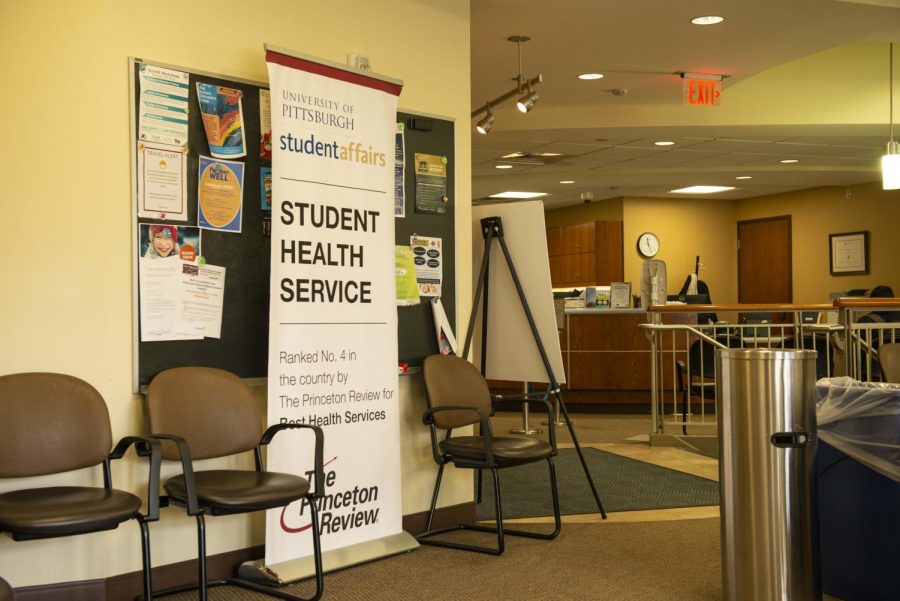Let’s talk about (healthy) sex
Pitt’s Student Health Service, located in Nordenberg Hall, offers a wide variety of sexual health care, including access to contraceptives and comprehensive STD testing, HIV testing and pregnancy testing.
February 13, 2020
Compared to their peers, Pitt students are more likely to be hitting the books than hitting the sheets.
In a study conducted by College Stats, students at Temple University were ranked as the top sexually active student body among U.S. college campuses with an average of 10.8 partners. In an especially Happy Valley, Penn State University cracked the top 20 with an average of 4.25 partners.
While Pitt didn’t make this particular list, Pitt students still contributed to the 38% of student respondents across the country who reported always using a condom, with 15% reporting that they never use a condom.
That shouldn’t be a problem for students, though, as they have access to free condoms, along with other sexual and reproductive health resources at the Student Health Service, located in Nordenberg Hall and averaging more than 36,000 visits per year relating to sexual health. There are also numerous resources and clubs students can take advantage of both on Pitt’s campus and in the Pittsburgh area.
Students Engaging in Conversations about Consent and Sexuality hopes to make students more aware of these and more resources on campus. Valerie Perna, a senior nursing major and president of SECCS, prides the club on providing safe, open and impactful conversations surrounding sex and sexual health resources on campus. The club meets weekly to discuss various current sexual topics and engage in sex-positive activities. One of their activities — “dirty confessions” — is designed to do just that.
Participants write the dirtiest thing someone has ever said or done to them and throw it into the circle where it is then read anonymously. Perna said this game has deeper implications concerning consensual sex.
“This shows that dirty talk can be consensual and doesn’t have to be robotic,” Perna said. “We talk with each other and learn from each other and our different experiences. We just want everyone to be safe and healthy whether it be sexually or otherwise.”
While SECCS offers a more informal approach to talking about sexual health, the SHS offers a wide variety of “full-service women’s, men’s and LGBTQ+ health care,” according to Marian Vanek, executive director of SHS.
These resources include access to contraceptives — including oral contraception, IUDs, Nexplanon and emergency contraceptives in the University Pharmacy — as well as comprehensive STD testing, HIV testing and pregnancy testing, Vanek said via email. Condoms are also available for free in the waiting room of the Student Health Center as well as the third floor restrooms in the WPU.
Clinicians also provide preventative services like Pap smear testing, HPV vaccines, male exams for erectile dysfunction and Pre-Exposure Prophylaxis. PrEP is a daily pill to prevent HIV that’s usually taken by those at high risk for contracting the disease. It reduces the chance of getting HIV from sex by 99%.
Vanek said utilizing these resources is important in maintaining sexual health and succeeding at Pitt overall.
“I do believe sexual health is a significant component of one’s overall health,” Vanek said. “Maintaining one’s good health contributes to an overall successful experience here at Pitt. Also, establishing good practices now will carry on well after graduation.”
Students can schedule an appointment by calling the SHS at 412-383-1800 or scheduling online via a secure portal. Vanek said during an appointment, clinicians ask students to complete a general health questionnaire that includes a medical history, discussion of symptoms or problems and a sexual history. Additional questions will then be asked that are specific to the appointment, whether it be for contraception or STD testing.
Vanek added that, “the entire process, visit, tests, etc., is private and confidential.”
Off-campus resources, like Planned Parenthood located in Downtown Pittsburgh, offer affordable resources for students as well. Sarah Dixon, Planned Parenthood of Western Pennsylvania’s public relations manager, said Planned Parenthood offers a wide range of sexual and reproductive health resources at a sliding-scale rate, which means its pricing is adjusted based on an individual’s income, and it also accepts private health insurance. Planned Parenthood’s services include gynecological care, birth control, pregnancy testing, annual pelvic and breast exams, screening and treatment for STDs and STIs, emergency contraceptives, medical and surgical abortions and professional counseling.
Dixon said Planned Parenthood aims to be affordable and accessible for everyone, including the large amount of college students it caters to.
“The care here is accessible. Don’t put it off because you think financially it’s out of your reach,” Dixon said. “At a time when a person might be exploring their sexuality, it’s important to do that safely. It is still possible to get STIs and get pregnant.”
Dixon said anyone can confidentially book appointments with Planned Parenthood online or through its call center.
Some students want Pitt to look beyond traditional sexual health resources though. Aliana Rao, a sophomore neuroscience major and vice president of TreasurHER — a club dedicated to improving access to menstrual products — said she agrees that sexual health resources need to be more accessible on campus, but she also wants free pads and tampons. TreasurHER assisted Kathleen Koesarie, Lauren Risser and Samantha Totoni — students in Pitt’s Graduate School of Public Health — last year in advocating for putting free menstrual products in restrooms across campus.
“It’s funny because you can get condoms literally everywhere, but they won’t give out free pads and tampons and I don’t understand the correlation,” Rao said. “I’m not saying one is better than the other, but you physically cannot control your period. You shouldn’t have to pay for those products, and if you do they shouldn’t be taxed and they should be widely available.”
Pitt recently installed new dispensers giving out tampons for free in bathrooms around campus, including on the lower level and first floor of the William Pitt Union and on the ground, second and third floors of the Cathedral of Learning.
Rao compared the stigma of periods to the stigma of sex many women experience growing up, which she said was evidenced in her Pakistani family. She said this makes it especially difficult for women from disadvantaged backgrounds to freely discuss periods.
“In Pakistani culture, you don’t talk about it. The stigma around it makes it seem like a bad thing,” Rao said. “It’s important to understand that while some of us have the privilege of getting those products without having to think about it, some people don’t have that same luxury or privilege.”
Vanek said despite external influences, it is important to seek resources and education, especially during college.
“We encourage students to practice safe sex and understand methods of protection and birth control,” Vanek said. “Students should take charge of their health — learn as much as one can about one’s personal health, prevention methods, insurance and other important aspects of health literacy.”



